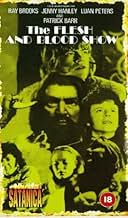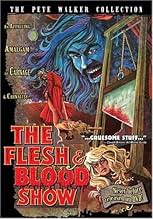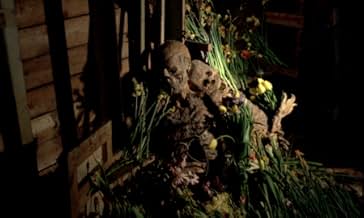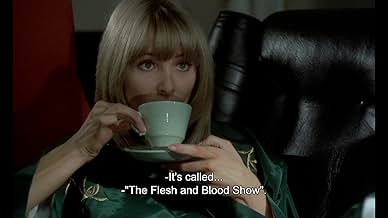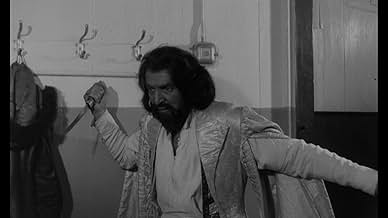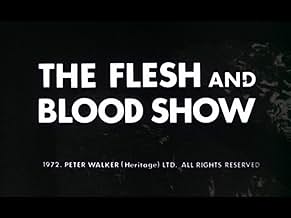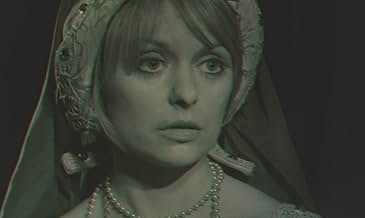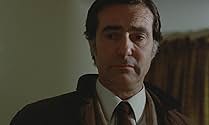IMDb रेटिंग
5.3/10
1.3 हज़ार
आपकी रेटिंग
अपनी भाषा में प्लॉट जोड़ेंActors rehearsing a show at a mysterious seaside theater are being killed off by an unknown maniac.Actors rehearsing a show at a mysterious seaside theater are being killed off by an unknown maniac.Actors rehearsing a show at a mysterious seaside theater are being killed off by an unknown maniac.
फ़ीचर्ड समीक्षाएं
A group of actors and a director are gathered together by a mysterious producer to rehearse a play in a creepy abandoned theater at the end of a pier off the English coast. In "Ten Little Indians" fashion they begin to disappear one by one. This sounds like a typical slasher movie, but in fact it preceded the slasher craze by many years. It was one of those movies like "Schoolgirl Killer", "Fright", and "Bay of Blood" that contained many of the elements of the slasher films and may have even influenced some of them a little, but was made well before "Black Christmas", "Halloween",and "Friday the 13th" initiated the deluge of slasher flicks.
This movie avoids many of what would later become tedious clichés of the slasher films. There's no heavy-breathing POV camera shots. The characters are stupid, but they are not so stupid that they don't notice their friends disappearing. The killer's motivation is actually somewhat believable and doesn't seem like something the filmmakers just pulled out of their collective keisters to justify the carnage. Actually, there isn't much carnage either. Most of the murders actually occur off-screen (blasphemy, I know). But what the movie lacks in blood, it makes up for in T and A. This movie marked a transition in British director Peter Walker's career from softcore sexploitation fare like "School for Sex" and "Four Dimensions of Greta" to his more mature and superior 70's horror films like "Frightmare" and "House of the Whipcord". Not surprisingly, Walker offers a hot shower of generous female nudity to prepare viewers for the sudden cold shower of the terror scenes.In the hilarious opening scene, for instance, an incredibly voluptuous actress is awakened by a knock on her door at three in the morning, so she gets out of her female "roommate's" bed and answers the door completely naked.
I'd recommend this movie to anyone, but people who like Pete Walker, and slasher movies that are actually well-crafted and scary will especially enjoy this one.
This movie avoids many of what would later become tedious clichés of the slasher films. There's no heavy-breathing POV camera shots. The characters are stupid, but they are not so stupid that they don't notice their friends disappearing. The killer's motivation is actually somewhat believable and doesn't seem like something the filmmakers just pulled out of their collective keisters to justify the carnage. Actually, there isn't much carnage either. Most of the murders actually occur off-screen (blasphemy, I know). But what the movie lacks in blood, it makes up for in T and A. This movie marked a transition in British director Peter Walker's career from softcore sexploitation fare like "School for Sex" and "Four Dimensions of Greta" to his more mature and superior 70's horror films like "Frightmare" and "House of the Whipcord". Not surprisingly, Walker offers a hot shower of generous female nudity to prepare viewers for the sudden cold shower of the terror scenes.In the hilarious opening scene, for instance, an incredibly voluptuous actress is awakened by a knock on her door at three in the morning, so she gets out of her female "roommate's" bed and answers the door completely naked.
I'd recommend this movie to anyone, but people who like Pete Walker, and slasher movies that are actually well-crafted and scary will especially enjoy this one.
Walker's first horror film is an intriguing and enjoyable mix of sex and chills set in an abandoned theater; interestingly, in the accompanying interview on the DVD, he states that the nudity was deemed obligatory at the time if the picture was to hope for a distribution deal (particularly since Walker was his own financier).
The plot starts off by having eight out-of-work actors being convened to the aforementioned remote location by a mysterious employer; though they occasionally indulge in the kind of silly yet pretentious improvisational exercise also at the core of Jacques Rivette's insanely-long (13 hours!) OUT ONE: NOLI ME TANGERE (1971), they're often just interested in getting laid and the girls in particularly act like sluts most of the time!! At first, I was annoyed by this apparent laziness in scripting (by Alfred Shaughnessy, a respected if little-known director in his own right) but, then, it's revealed that this was the reason these young and 'morally corrupt' folk were called upon to begin with (as the continuation of a notorious incident from the wartime era which had actually caused the theater's closure).
The male members of the cast are effectively enough led by Ray Brooks (from Richard Lester's Swinging London comedy THE KNACK [1965]) and also include Robin Askwith (soon to rise to dubious prominence with the smutty "Confessions" films) and veteran Patrick Barr (who turns in a bravura performance, particularly once his true identity is exposed). As for the girls, they all look great in and out of clothes particularly Jenny Hanley (who, interestingly, discovers to have an inextricable link of her own with the gloomy theater) and Luan Peters (who escapes the murderer{s}' clutches the first time but not the second).
The film attempts a reasonable imitation throughout of the Italian Giallo style (that country, then, paid it the compliment by borrowing its single setting for Lamberto Bava's popular but third-rate DEMONS [1985]) though it culminates with a rather unnecessary 3-D gimmick (which Walker had already utilized in the lackluster "Rashomon"-type sex comedy THE FOUR DIMENSIONS OF GRETA [1972]). For the record, of the director's horror outings, I've yet to get my hands on SCHIZO (1976) and HOME BEFORE MIDNIGHT (1979)
The plot starts off by having eight out-of-work actors being convened to the aforementioned remote location by a mysterious employer; though they occasionally indulge in the kind of silly yet pretentious improvisational exercise also at the core of Jacques Rivette's insanely-long (13 hours!) OUT ONE: NOLI ME TANGERE (1971), they're often just interested in getting laid and the girls in particularly act like sluts most of the time!! At first, I was annoyed by this apparent laziness in scripting (by Alfred Shaughnessy, a respected if little-known director in his own right) but, then, it's revealed that this was the reason these young and 'morally corrupt' folk were called upon to begin with (as the continuation of a notorious incident from the wartime era which had actually caused the theater's closure).
The male members of the cast are effectively enough led by Ray Brooks (from Richard Lester's Swinging London comedy THE KNACK [1965]) and also include Robin Askwith (soon to rise to dubious prominence with the smutty "Confessions" films) and veteran Patrick Barr (who turns in a bravura performance, particularly once his true identity is exposed). As for the girls, they all look great in and out of clothes particularly Jenny Hanley (who, interestingly, discovers to have an inextricable link of her own with the gloomy theater) and Luan Peters (who escapes the murderer{s}' clutches the first time but not the second).
The film attempts a reasonable imitation throughout of the Italian Giallo style (that country, then, paid it the compliment by borrowing its single setting for Lamberto Bava's popular but third-rate DEMONS [1985]) though it culminates with a rather unnecessary 3-D gimmick (which Walker had already utilized in the lackluster "Rashomon"-type sex comedy THE FOUR DIMENSIONS OF GRETA [1972]). For the record, of the director's horror outings, I've yet to get my hands on SCHIZO (1976) and HOME BEFORE MIDNIGHT (1979)
I have been a fan of director/producer Pete Walker's 1970's horror films in the past. I never knew he had a filmography of what shall I call them 'sexploitation' films earlier in his filmmaking career.
Now this 1972 UK film has elements of sexploitation in a slasher horror film as several members of an acting group are murdered at a disused theatre at the end of an old pier in a seaside town in England, out of season to add to the ambience of proceedings!
Now my review title is a play on the Confessions films which were hugely successful in the 1970s starring Robin Askwith who is incidentally in this film as well as one of the young actors. Askwith plays a typical Timothy Lea type character from the Confessions franchise and points to the 'sexploitation' scenes in this film, which is a shame in my opinion. It puts the UK film industry of the period in a bad light. Mixed in with the gore of a slasher horror are scenes of the characters in semi-naked scenes.
Atmospheric and a mediocre early Pete Walker horror. I have found his later 1970's films better if I am honest. This film is very low budget. Scream (1996) it isn't!
Now this 1972 UK film has elements of sexploitation in a slasher horror film as several members of an acting group are murdered at a disused theatre at the end of an old pier in a seaside town in England, out of season to add to the ambience of proceedings!
Now my review title is a play on the Confessions films which were hugely successful in the 1970s starring Robin Askwith who is incidentally in this film as well as one of the young actors. Askwith plays a typical Timothy Lea type character from the Confessions franchise and points to the 'sexploitation' scenes in this film, which is a shame in my opinion. It puts the UK film industry of the period in a bad light. Mixed in with the gore of a slasher horror are scenes of the characters in semi-naked scenes.
Atmospheric and a mediocre early Pete Walker horror. I have found his later 1970's films better if I am honest. This film is very low budget. Scream (1996) it isn't!
"The Flesh and Blood Show" bookends Pete Walker's 'golden period' of horrors, with "Schizo" (1976) at the other end; it is a gruesome piece of film-making that shows improvements in Walker's work from "Die Screaming, Marianne" - and yet he is still limbering up, in truth.
Patrick Barr - to be used again by PW - is excellent here, playing 'the Major', the first in a line of Walker protagonists who appear to be harmless English eccentrics, but are actually... well, that would be telling! The youth characters may be rather stereotyped, but that is part of Walker's approach: to set a licentious, permissive youth against a resentful and uncompromisingly vengeful older generation. It is much to Walker's credit that few if any characters could be described as typical heroes. And he doesn't take sides; the photography indeed mimics the voyeur's view at times - implicating the audience, using the trick first deployed by Michael Powell in "Peeping Tom" (1960).
The out-of-season seaside setting - Cromer, apparently - fits aptly into this dialectic. The troupe of young actors' arrival seemingly doubles the ageing population of the resort, who can seemingly only dream of the past. It can even be argued that there are pre-echoes of Alan Bennett's use of Morecambe in "Sunset Across the Bay" (BBC, 1975) - though of course, lacking quite the same sad humour and dry insight.
Still, it is an serviceable enough shocker. Not as bizarrely gripping as Walker's subsequent Melodramas of Discontent, but a decisive step in that direction. And with a script by Alfred Shaughnessy (one of the prime wits behind LWT's "Upstairs, Downstairs") and a suitably eerie score from Cyril Ornadel (who composed all of the music for ATV's seminal "Sapphire and Steel"). Oh, and Robin Askwith... who is enjoyably absurd in horror films (see also the ludicrous "Horror Hospital" from the following year), where he is rather more horrific in myriad dire sex comedies to come.
Patrick Barr - to be used again by PW - is excellent here, playing 'the Major', the first in a line of Walker protagonists who appear to be harmless English eccentrics, but are actually... well, that would be telling! The youth characters may be rather stereotyped, but that is part of Walker's approach: to set a licentious, permissive youth against a resentful and uncompromisingly vengeful older generation. It is much to Walker's credit that few if any characters could be described as typical heroes. And he doesn't take sides; the photography indeed mimics the voyeur's view at times - implicating the audience, using the trick first deployed by Michael Powell in "Peeping Tom" (1960).
The out-of-season seaside setting - Cromer, apparently - fits aptly into this dialectic. The troupe of young actors' arrival seemingly doubles the ageing population of the resort, who can seemingly only dream of the past. It can even be argued that there are pre-echoes of Alan Bennett's use of Morecambe in "Sunset Across the Bay" (BBC, 1975) - though of course, lacking quite the same sad humour and dry insight.
Still, it is an serviceable enough shocker. Not as bizarrely gripping as Walker's subsequent Melodramas of Discontent, but a decisive step in that direction. And with a script by Alfred Shaughnessy (one of the prime wits behind LWT's "Upstairs, Downstairs") and a suitably eerie score from Cyril Ornadel (who composed all of the music for ATV's seminal "Sapphire and Steel"). Oh, and Robin Askwith... who is enjoyably absurd in horror films (see also the ludicrous "Horror Hospital" from the following year), where he is rather more horrific in myriad dire sex comedies to come.
The plot is a familiar one. A bunch of people go to an abandoned building to stay there, and some of them start dying.
Even taken more specifically, this is a group of young actors who go to an old theater, and are killed for reasons relating to the theater's past. The Clown at Midnight (1998) is similar.
The movie has a lot of dialog, which isn't of much interest. People go off wandering, and sometimes they come back and sometimes they don't. They visit an older couple, and I didn't get a sense of where their house was in relation to the theater, which seemed to be on an island. Police actually are contacted fairly easily early on. The actors continue to stay at the theater far beyond what is sensible.
There's a fair amount of female nudity, even some full frontal nudity. There is even some full frontal nudity from one of the men. Deaths are not depicted very graphically, to the extent they are barely on screen at all. The killer is a heavy breather, with a black mask and gloves.
The music throughout reminded me of the incidental music from the original Scooby Doo series!
There's a flashback scene which is rather surprising, that has a couple having sex in front of a young girl. The girl's scenes were quite obviously edited in (i.e. she wasn't in the room with the nude actors), but it was still a little shocking. That scene was a little better than the rest of the movie, although it started off with a staging of Othello, which was not too involving. There's another good scene in which some of the actors think one of them is shining a spotlight, but it then shines on the person they though was handling it, who was nude. Being a little thick, they don't immediately realize the spotlight must be handled by someone else, nor do they notice how the nude figure doesn't appear to have any life in it.
At the end of the Monterey Home Video, there were trailers for The Slasher is the Sex Maniac, Night After Night After Night, and The Grim Reaper, all of which looked much better. Although I've seen a cut version of The Grim Reaper AKA Antropophagus (1980), and didn't think it was all that hot, but then the trailer for it was all of five seconds long or so. The other trailers were of ordinary length.
Even taken more specifically, this is a group of young actors who go to an old theater, and are killed for reasons relating to the theater's past. The Clown at Midnight (1998) is similar.
The movie has a lot of dialog, which isn't of much interest. People go off wandering, and sometimes they come back and sometimes they don't. They visit an older couple, and I didn't get a sense of where their house was in relation to the theater, which seemed to be on an island. Police actually are contacted fairly easily early on. The actors continue to stay at the theater far beyond what is sensible.
There's a fair amount of female nudity, even some full frontal nudity. There is even some full frontal nudity from one of the men. Deaths are not depicted very graphically, to the extent they are barely on screen at all. The killer is a heavy breather, with a black mask and gloves.
The music throughout reminded me of the incidental music from the original Scooby Doo series!
There's a flashback scene which is rather surprising, that has a couple having sex in front of a young girl. The girl's scenes were quite obviously edited in (i.e. she wasn't in the room with the nude actors), but it was still a little shocking. That scene was a little better than the rest of the movie, although it started off with a staging of Othello, which was not too involving. There's another good scene in which some of the actors think one of them is shining a spotlight, but it then shines on the person they though was handling it, who was nude. Being a little thick, they don't immediately realize the spotlight must be handled by someone else, nor do they notice how the nude figure doesn't appear to have any life in it.
At the end of the Monterey Home Video, there were trailers for The Slasher is the Sex Maniac, Night After Night After Night, and The Grim Reaper, all of which looked much better. Although I've seen a cut version of The Grim Reaper AKA Antropophagus (1980), and didn't think it was all that hot, but then the trailer for it was all of five seconds long or so. The other trailers were of ordinary length.
क्या आपको पता है
- ट्रिवियाWhen Jenny Hanley refused to appear naked on screen, director Pete Walker inserted full-frontal nudity using a body double (reportedly one of her co-stars), resulting in a formal complaint from Hanley's agent. To make it even worse, the double had much larger breasts than Hanley.
- गूफ़As Luan Peters investigates the prop room below the stage she makes a big deal of brushing away cobwebs, but there aren't any.
- इसके अलावा अन्य वर्जनHas had two different releases in the UK, the early eighties 'Vampix video' release presented the flashback scene in 3-d, while the more recent 'Satanica video' release has the flashback sequence in black and white.
- कनेक्शनFeatured in 42nd Street Forever, Volume 1 (2005)
टॉप पसंद
रेटिंग देने के लिए साइन-इन करें और वैयक्तिकृत सुझावों के लिए वॉचलिस्ट करें
- How long is The Flesh and Blood Show?Alexa द्वारा संचालित
विवरण
- चलने की अवधि
- 1 घं 36 मि(96 min)
- ध्वनि मिश्रण
- पक्ष अनुपात
- 1.85 : 1
इस पेज में योगदान दें
किसी बदलाव का सुझाव दें या अनुपलब्ध कॉन्टेंट जोड़ें


